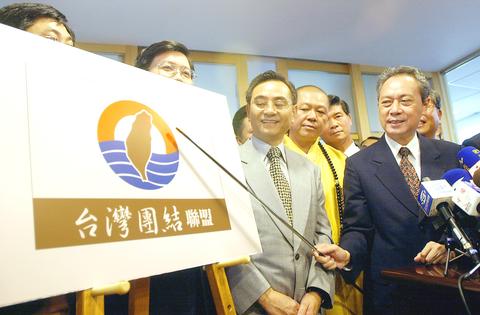Politicians with close ties to former president Lee Teng-hui (李登輝) announced yesterday the formation of a new political party that hopes to win as many as 40 seats in the year-end legislative elections.
Former interior minister Huang Chu-wen (黃主文) unveiled the party's name, the Taiwan Solidarity Union (台灣團結聯盟), and the party's logo yesterday.

PHOTO: CHEN CHENG-CHANG, TAIPEI TIMES
"We've adopted the word solidarity because we believe that it is the most important thing that all Taiwanese currently expect," Huang said during yesterday's press conference.
Huang said the party would attempt to help the DPP bring stability to the legislature and put an end to the struggle between the opposition alliance and the government.
Accompanied by roughly 20 members who will represent the party in the legislative elections, Huang also unveiled the party's logo.
The emblem contains a brown-colored silhouette of Taiwan, symbolizing an earthy native focus. It is enclosed in a circle with a background of different shades of blue, which symbolizes the ocean.
"The logo means that Taiwan is just like the sun rising over the ocean," Huang said.
Lee, the former KMT chairman, has repeatedly criticized his party with being a sore loser after last year's presidential elections, saying the party should not purposely block President Chen Shui-bian's (陳水扁) policies in the legislature.
According to Huang, Lee authorized him to form a new party to contest the year-end election and cooperate with the DPP after the election.
The party will hold a founding ceremony on Aug. 12 and announce a slate of legislative candidates later that day.
Lo Chih-ming (
Former KMT National Assembly delegate Chen Chien-ming (陳建銘), who will also represent the party in the elections, said that they will invite Lee and President Chen to jointly attend the Aug. 12 founding ceremony.
"The Taiwan Solidarity Union will loyally advocate former president Lee's ideals and continue to implement his guidelines, like continuing to maintain the former KMT administration's `no haste, be patient' policy in handling cross-strait investment," Chen said.
The idea that relations between Taiwan and China are "special state-to-state" in nature will also be a part of the party's platform.
While there have been recent threats to have Lee removed from the KMT for his support of the newly formed party, the KMT has thus far hesitated in confronting its former chairman.
Last month, old guard party member Liang Su-yung (
Chen Kang-ching (陳庚金), chief of the KMT disciplinary division, recently said "the department will approach the matter according to due process," implying it would not take action. He noted that it was for the party's administrative and management committee to decide whether Lee had indeed misused KMT funds, and for the organization section to determine whether Lee had in any way double-crossed the party.
In several recent interviews, Lee has blamed the 107-year-old party for its increasing drift toward China.
"No rules bar members from criticizing the party," said the KMT official, noting that the practice is rather common even among KMT stalwarts.
Still, the party is set to punish members who seriously harm the party's reputation and who endanger the party's existence. By that standard, those who join the Taiwan Solidarity Union will be deprived of their membership once the new political party formally registers with the Ministry of the Interior.

SECURITY: As China is ‘reshaping’ Hong Kong’s population, Taiwan must raise the eligibility threshold for applications from Hong Kongers, Chiu Chui-cheng said When Hong Kong and Macau citizens apply for residency in Taiwan, it would be under a new category that includes a “national security observation period,” Mainland Affairs Council (MAC) Minister Chiu Chui-cheng (邱垂正) said yesterday. President William Lai (賴清德) on March 13 announced 17 strategies to counter China’s aggression toward Taiwan, including incorporating national security considerations into the review process for residency applications from Hong Kong and Macau citizens. The situation in Hong Kong is constantly changing, Chiu said to media yesterday on the sidelines of the Taipei Technology Run hosted by the Taipei Neihu Technology Park Development Association. With

CARROT AND STICK: While unrelenting in its military threats, China attracted nearly 40,000 Taiwanese to over 400 business events last year Nearly 40,000 Taiwanese last year joined industry events in China, such as conferences and trade fairs, supported by the Chinese government, a study showed yesterday, as Beijing ramps up a charm offensive toward Taipei alongside military pressure. China has long taken a carrot-and-stick approach to Taiwan, threatening it with the prospect of military action while reaching out to those it believes are amenable to Beijing’s point of view. Taiwanese security officials are wary of what they see as Beijing’s influence campaigns to sway public opinion after Taipei and Beijing gradually resumed travel links halted by the COVID-19 pandemic, but the scale of

A US Marine Corps regiment equipped with Naval Strike Missiles (NSM) is set to participate in the upcoming Balikatan 25 exercise in the Luzon Strait, marking the system’s first-ever deployment in the Philippines. US and Philippine officials have separately confirmed that the Navy Marine Expeditionary Ship Interdiction System (NMESIS) — the mobile launch platform for the Naval Strike Missile — would take part in the joint exercise. The missiles are being deployed to “a strategic first island chain chokepoint” in the waters between Taiwan proper and the Philippines, US-based Naval News reported. “The Luzon Strait and Bashi Channel represent a critical access

Pope Francis is be laid to rest on Saturday after lying in state for three days in St Peter’s Basilica, where the faithful are expected to flock to pay their respects to history’s first Latin American pontiff. The cardinals met yesterday in the Vatican’s synod hall to chart the next steps before a conclave begins to choose Francis’ successor, as condolences poured in from around the world. According to current norms, the conclave must begin between May 5 and 10. The cardinals set the funeral for Saturday at 10am in St Peter’s Square, to be celebrated by the dean of the College